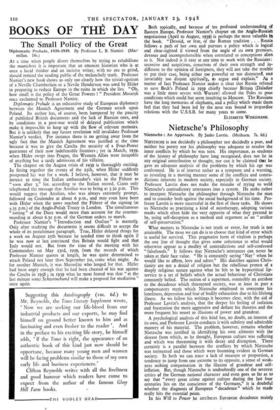BOOKS OF THE DAY
The Small Policy of the Great
AT a time when people divert themselves by trying to rehabilitate the munichois it is important that an eminent historian who is at once a lucid thinker and an incisive writer, with no axe to grind, should remind the reading public of the melancholy truth. Professor Namier's new book shows us only too clearly how the trivial• egotism of a Neville Chamberlain or a Nevile Henderson was used by Hitler in preparing to reduce Europe to the ruins in which she lies. " Oh, how small is the policy of the Great Powers ! " President Masaryk once exclaimed to Professor Namier.
Diplomatic Prelude is an exhaustive study of European diplomacy between the Munich Agreement and The German attack upon Poland. Its author has, of course, been hampered by the paucity of published British documents and the lack of Russian ones, and by conditions in a post-war world of delayed publication which make it impossible to keep up with the flow of relevant memoirs. But it is unlikely that any future revelation will invalidate Professor Namier's verdict. For instance there is no getting away from the ugly fact that the Munich Agreement was justified at the time because it was to give the Czechs the security of a Four-Power guarantee of their now indefensible frontiers ; yet in March, 1939, when Hitler swept into Prague, the Western Allies were incapable of anything but a tardy admission of his villainy.
The chapter on the August crisis of 1939 is thoroughly exciting. In fitting together the events of the 25th, when Hitler suddenly postponed his war for a week, I believe, however, that it may be inexact to time the Italian ambassador's visit to the Fiihrer as " soon after 3," for, according to the Italian record, Ciano only telephoned the message that Attolico was to bring at 5.3o p.m. This would suggest that Attolico, who was always extremely prompt, followed on Coulondre at about 6 p.m., and may even have been with Hitler when the news reached the Fiihrer of the signing (at j.35 p.m.) of the Anglo-Polish Treaty in London. The simultaneous " ratting " of the Duce would more than account for the counter- manding at about 6.3o p.m.. of the German orders to march.
Professor Namier's " Introduction and Outline" is masterly. Only after studying the documents it seems difficult to accept the whole of its penultimate paragraph. True, Hitler delayed things for a week on August 25th because he needed time to think again if he was now at last convinced that Britain would fight and that Italy would not. But from the time of the meeting with his Commanders on May 23rd, 1939, from the records of which Professor Namier quotes at length, he was quite determined to attack Poland not later than September 1st, come what might. As for another Munich, it was Mussolini who longed for that. Hitler had been angry enough that he had been cheated of his war against the Czechs in 1938 ; in 1939 what he most feared was that "at the last minute some Schweinehund will make a proposal for mediation " once again. Both topically, and because of his profound understanding of Eastern Europe, Professor Namier's chapter on the Anglo-Russian negotiations (April to August, 1939) is perhaps the most valuable In the book. "Devoid, or free, of the Roman tradition . . . Russia follows a path of her own and pursues a policy which is logical and clear-sighted if viewed from the angle of its own premises, devious and incomprehensible when correlated to conceptions alien to it. Nor indeed is it easy at any time to work with the Russians: secretive and suspicious, conscious of their own strength and in- different to the opinion of foreigners, they will not take the trouble to put their case, being either too powerful or too distracted, and invariably too distant spiritually, ro argue and explain." A a matter of fact Professor Namier makes it clear that Russia refused to save Beck's Poland in 1939 chiefly because Britain (Daladier was a little more severe with Warsaw) allowed the Poles to pose conditions which could but seem insulting to Moscow. The Russians have the long memories of elephants, and a policy which made them feel that they had been led by the nose was bound to jeopardise relations with the U.S.S.R. for many years to come.
ELIZABETH WISKEMANN.






























 Previous page
Previous page